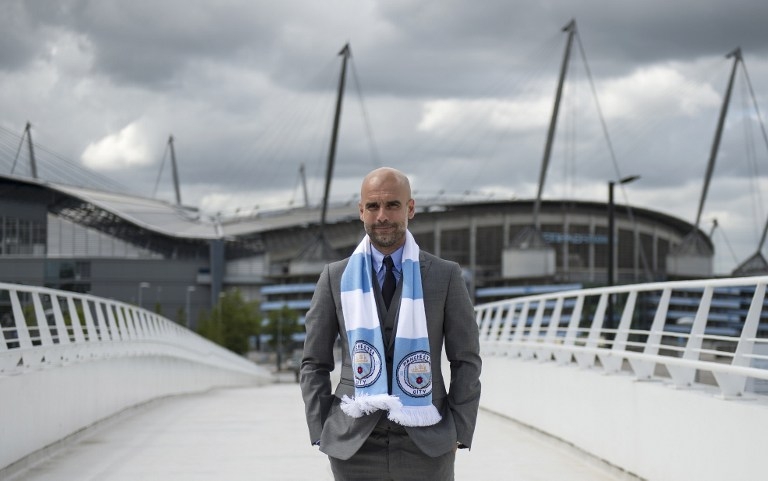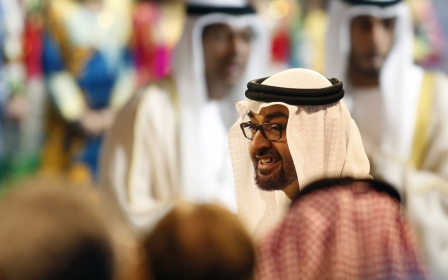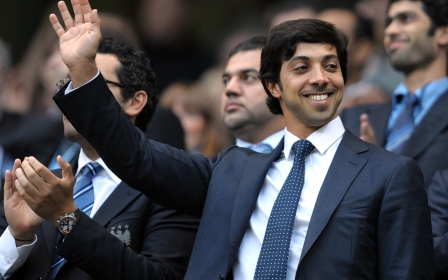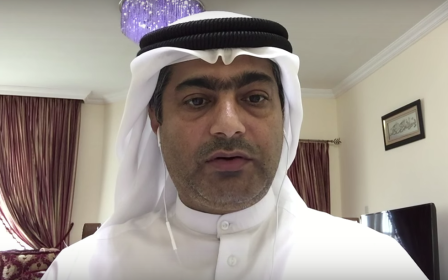EXCLUSIVE: Human rights groups tackle Manchester leaders over UAE ties

Manchester’s political and footballing leaders must use their close commercial ties with the United Arab Emirates (UAE) to urge the Gulf state to end torture, abolish modern slavery and free jailed activists, two leading human rights charities have said.
In two letters, seen exclusively by Middle East Eye, Human Rights Watch and Amnesty International have used the the forthcoming 197th anniversary of the Peterloo Massacre of protesters calling for political reform in the UK to demand Manchester City Council and Manchester City Football Club use their links to the oil-rich Gulf state to call on its leadership to respect human rights.
Manchester has become a key hub for UAE investment in the UK after Mansour bin Zayed Al Nahyan, the country’s deputy prime minister, purchased Manchester City in 2008 through the Abu Dhabi United Group (ADUG).
Since 2008 Mansour has invested more than £1bn ($1.3bn) turning around the club’s fortunes, while Manchester City Council has entered into a $1.3bn joint venture with a firm controlled by ADUG to regenerate the poorer east of city with up to 6,000 new homes.
Both organisations openly boast of these close commercial links with the UAE, a federation of seven emirates dominated by oil-rich Abu Dhabi. However, the UAE has been branded a “black hole” for human rights by campaigners, who say the use of torture by the authorities is “systematic".
In the two separate letters to council leaders and the chairman of Manchester City Football Club, the campaign groups highlight Manchester’s heritage of respect for human rights, but say this should not be “besmirched” by uncritical relations with the UAE.
“Relationships involving the Council and the UAE should not and need not come at the cost of an abandonment of the values that Manchester proudly proclaims as part of its heritage,” reads the letter to Richard Leese, leader of Manchester City Council, and Howard Bernstein, the council's chief executive.
This letter to the two council leaders goes on to call for the UAE to investigate allegations of torture, to allow the United Nations Special Rapporteur on Torture access to the country, to repeal laws that allow for the physical chastisement of women, desist from arbitrarily deporting workers who demand their right to strike and to release human rights defenders, including Mohamed al-Roken, a lawyer sentenced to 10 years in jail for voicing dissent.
The letter reads: “The United Arab Emirates is currently a place where people risk their liberty by making their voices heard and by speaking out, including against human rights violations. It is a country where modern forms of slavery can still flourish on account of its leaders’ refusal to enact and enforce laws, where laws and policies make women – UAE citizens as well as foreign residents - highly vulnerable to physical and sexual abuse, and where people who criticise its rulers or express a desire for even modest democratic reforms are labelled terrorists, subjected to unfair trials, and sentenced to lengthy prison sentences.”
The letter calls on Leese and Bernstein to take “simple and principled steps” to support victims of torture in the UAE and use commercial ties to ensure relationships with senior figures in the country do not “besmirch” Manchester’s reputation as a city with a history of “standing up” for a range of celebrated historical causes in the UK, ranging from the anti-slavery movement to the Suffragettes' campaign for women's right to vote and pro-democracy demonstrations.
The letters, from earlier this year, are being made public on the eve of the 197th anniversary of the Peterloo Massacre in the city on Tuesday. The massacre saw military horsemen from a local cavalary regiment charge reform campaigners in St Peter’s Field, leaving 15 dead.
The event was critical to the freedoms Manchester enjoys today and led to the foundation of the Manchester Guardian in 1821, which in turn became the modern day Guardian newspaper.
Nicholas McGeehan, the Gulf researcher at Human Rights Watch, who worked on the letters, told MEE: “Manchester’s civic leaders celebrate the city’s proud history of standing up for fundamental rights, which obviously poses some awkward questions about their relationship with a UAE government that tramples all over these rights in the present day.
“The point we’ve made to the council, and to other influential figures in Manchester, is that they can respect the city’s traditions by calling on the UAE to make some basic reforms, and releasing Mohamed al-Roken on the anniversary of the Peterloo massacre would be a great place to start.”
Last year the Guardian revealed that government ministers in Whitehall had set up a special unit, codenamed Project Falcon, to give UAE privileged access to Britain’s political elite and prime land deals.
The Guardian had previously reported how UAE threatened to block billions of pounds worth of arms deals with the UK, if the then prime minister, David Cameron, did not act against the Muslim Brotherhood after it took power in Egypt.
At the time that Project Falcon was established former prime minister Tony Blair was the Middle East peace envoy and was acting for the UAE. Whitehall was forced to intervene when one of London’s top universities caused a “crisis” by questioning a $77.5m donation by the UAE. The donation to the world famous Great Ormond Street Hospital for a rare diseases centre was a gift from Sheikha Fatima Bint Mubarak, mother of the crown prince.
However, just before the announcement of the centre in 2014, the gifts acceptance committee of University College London, which oversees research with Great Ormond Street, raised concerns over the cash.
The deal eventually went ahead, as did the development deal in Manchester, despite complaints that a report detailing its commercial arrangement was kept secret.
Adam Prince, a spokesperson for Manchester Shield, a local pressure group calling for a better built environment in the city, told MEE that the development was a “major concern” which lacks “transparency” and suitable levels of affordable housing.
According to documents at Companies House, the development is controlled by an offshore company, Loom Holdings, prompting questions over why Manchester City Council has gone into business with a firm based offshore. Loom Holdings is itself controlled by ADUG, the private equity group owned by Mansour, the brother of Abu Dhabi’s ruling crown prince and owner of Manchester City Football Club.
In the letter to the Premier League club, Human Rights Watch and Amnesty International called for a meeting with the club’s chairman to raise human rights concerns. The groups say they did not receive a reply.
The club did not responded to repeated request for comment from MEE.
Critics have long argued that ownership of the Premier League club has allowed Abu Dhabi to “construct a public relations image of a progressive Gulf state, which deflects attention from what is really going on in the country".
The club is once again expected to challenge for top honours this season, with the club kicking off its new season on Saturday with Pep Guardiola, the former Barcelona coach who is considered one of the world's top managers, in charge for the first time.
Amnesty International UK’s advocacy officer Kieran Aldred, said: “The UAE has deep pockets but a worryingly poor human rights record. Many Mancunians will appreciate what Emirati money has done for Manchester, but they'll also be extremely concerned about freedom of speech being suppressed and the host of unfair trials and torture cases that have occurred in the UAE.
”This is real opportunity for Manchester City Council and all other bodies in Manchester with commercial relations with the UAE to use their considerable influence with the Emirati authorities to raise human rights and show that they care about these issues.“
A spokesman for Manchester City Council said it could not comment as Leese and Bernstein were both “away”.
On the ground in the city though, there is obvious concern. “Many of Manchester’s leaders spoke at the 'Pray for Orlando' vigils in the city, yet LGBQT minorities face imprisonment and even a death sentence in UAE,” said Prince.
“Likewise, there are questions on women’s rights and the brutality of punishment under criminal law, which are at odds with Manchester’s equality and human rights policies. It seems to me these concerns must be taken seriously in a council that endorses equality ethics above all else.”
This article is available in French on Middle East Eye French edition.
New MEE newsletter: Jerusalem Dispatch
Sign up to get the latest insights and analysis on Israel-Palestine, alongside Turkey Unpacked and other MEE newsletters
Middle East Eye delivers independent and unrivalled coverage and analysis of the Middle East, North Africa and beyond. To learn more about republishing this content and the associated fees, please fill out this form. More about MEE can be found here.




